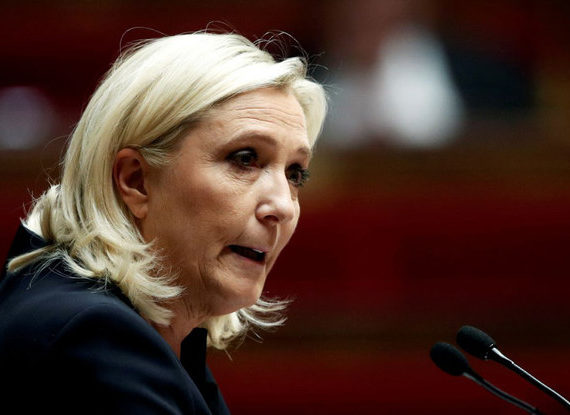Arab News
By: Rabbi Marc Schneier
May 6, 2022

Marine Le Pen, member of parliament and leader of French far-right National Rally (Rassemblement National) party. (Reuters)
Too often we have discussed the rise of the far right in Europe as the natural manifestation of a radical fringe, a pernicious threat that periodically wreaks social havoc but is far from the corridor of power and is ultimately contained. Last month’s French presidential election tells a different story.
Marine Le Pen received over of 41 percent of the vote, an unsuccessful performance that nevertheless shatters the status quo. It is demonstrably clear that the views espoused by Le Pen — including the wholesale stigmatization of Arab and African migrants — no longer represent the fringe, but large segments of French public opinion. And it suggests an even more perilous future.
As in the US, France is experiencing its own democratic crisis of confidence. Almost half of voters aged 25 to 34 chose Le Pen, effectively casting ballots in favor of ideas that — as President Emmanuel Macron rightly pointed out in his debate with Le Pen — contradict the very concepts of the Enlightenment that represent France’s unique intellectual legacy and its gifts to civilization. The question is: Why?
Clearly, two years of pandemic and uneven social and economic recovery have strained voting publics throughout the West, and ascendant populists have found it far easier to prioritize cultural rhetoric than to address genuine economic and class frustrations. Scapegoating foreigners has been a particularly effective tool, as Le Pen showed in promising a national referendum to deny millions of people the chance to immigrate to France or become French citizens.
But we as publics have also been willing accomplices in the efforts by Le Pen and other political extremists to rebrand, or “de-demonize,” hate and intolerance. Like other leaders, Le Pen has threaded the rhetorical lines between provocative and dangerous, and policy lines between inflammatory and downright illegal. Lamentably, we allowed this banalization to take place.
“Le Pen and her party know that what they stand for is wrong, but they see it as effective.”
Rabbi Marc Schneier
For the record, Le Pen imposed superficial reforms and expelled some members accused of blatant racism or antisemitism as she transitioned the National Front and its affiliates toward a semblance of political respectability in France.
But herein lies part of the great irony of her movement. Even as leaders foment xenophobia and instrumentalize a fear of foreigners, they acknowledge the harms of hate speech to prospects of gaining power. In essence, Le Pen and her party know that what they stand for is wrong, but they see it as effective.
French voters partially proved them right last month. Focusing largely on rural voters, the far-right played on real economic preoccupation and latent forces of prejudice that have always existed, but had been tamed by France’s better angels.
Many of Le Pen’s proposals are nakedly cynical. Take the ritual slaughter of animals by Muslims and Jews. I doubt that most French voters are truly invested in the production of halal or kosher food, or believe these matters affect their freedoms or economic livelihoods.
The hijabs and burqas worn by some Muslim women are another case in point. It is undeniable that these visual symbols of the increasingly large Muslim minority in France have caused frictions. But comparing these articles of attire or Muslims engaged in prayer to the Nazi occupation of France during the Second World War, as Le Pen did in 2010, is a deliberate incitement of Islamophobia.
Le Pen and other populists also have cynically sought to divide Muslims and Jews, imperiling the very interfaith fabric that made France a model of integration and collaboration for other nations. In 2014, she blamed antisemitism on the “implantation of Islamism” in France. The fact is that antisemitism has existed in France for centuries, and Le Pen’s explanation is a copout. She knows this firsthand, given her father’s frequent trivialization of the Holocaust, from which she has distanced herself.
I say nothing about Le Pen’s divisive positions on international policy, from her determination to distance France from NATO to claiming that the US, not Russia, is responsible for Ukraine’s misery. Her refusal to condemn Vladimir Putin should speak for itself, but these are questions for the French people to decide.
What troubles me is how leaders such as Le Pen consciously and openly threaten to derail cooperation among peoples of different religions, ethnicities, backgrounds and philosophies, at home and abroad. If you look at her personal attacks on Turkey and Gulf countries, for example, we see criticisms that are fact-free and play to stereotypes, intended to reinforce prejudices and foundations of distrust.
I agree with Le Pen that France should be proud. It has done as much as perhaps any other country in shaping modern diplomacy, and how successful international cultural engagements can be of benefit to all mankind.
Pride is different from fear and anger, however. The France that achieved so much for so many centuries was a place that attracted the great minds of Europe and beyond, fusing their talents and incorporating their ideals into a grand national project that few other countries can rival. In celebrating France, the French should honor their tolerance and inclusion, which have gone hand in hand with economic, social and cultural accomplishments.
Given the relative closeness of the election, we can all breathe a sigh of relief that France made the right choice in rejecting Le Pen — for now. But 41 percent of the voters is already 41 percent too many, and we risk sliding into an even more treacherous future, with the potential for a global economic recession on the horizon. It will become only easier for leaders to push the politics of convenience over conviction, and divisiveness over unity.
We all have a role to play in rejecting such trend lines, in standing against the stigmatization of our neighbors and those far away who may look or sound a little different. We cannot sit idly by while policies such as those championed by Le Pen become even more normalized and less outrage inducing. One thing is certain: Now is certainly not the time for complacency.
• Rabbi Marc Schneier is president of the Foundation for Ethnic Understanding.




